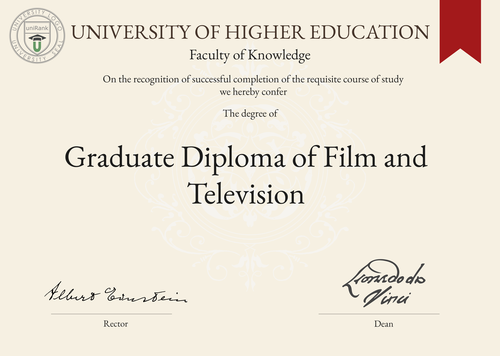
Graduate Diploma of Film and Television (GradDip Film and TV)
Guide to Graduate Diploma of Film and Television Program/Course/Degree
Graduate Diploma of Film and Television (GradDip Film and TV)

Program Name:
Graduate Diploma of Film and TelevisionProgram or Degree abbreviation:
GradDip Film and TVDuration range:
The duration of the program can vary depending on the country or university, but typically ranges from 1 to 2 years.Tuition range:
Tuition fees for the program can vary based on the chosen country or university. The range can vary from affordable to expensive, depending on the location and reputation of the institution.Overview:
The Graduate Diploma of Film and Television program is designed to provide students with a comprehensive understanding of the film and television industry. It offers practical training and theoretical knowledge to equip students with the skills necessary for a successful career in this field.Curriculum Overview by year:
The curriculum of the program is structured to cover various aspects of film and television production. In the first year, students typically focus on foundational courses such as screenwriting, cinematography, editing and directing. In the second year, they delve deeper into specialized areas such as documentary filmmaking, sound design, visual effects and post-production.Key Components:
The key components of the program include hands-on practical training, theoretical coursework, industry internships and collaborative projects. Students gain experience in script development, pre-production planning, production management and post-production techniques. They also learn about film theory, storytelling and critical analysis.Career Prospects:
Graduates of the program can pursue various career paths in the film and television industry. They can work as directors, producers, cinematographers, editors, screenwriters, or production managers. They may find employment in film production companies, television networks, advertising agencies, or independent film projects.Salary Expectations:
Salary expectations for graduates of the program can vary depending on factors such as experience, location and job role. Entry-level positions may offer lower salaries, while experienced professionals in high-demand roles can earn higher incomes. It is important to note that salaries can vary significantly in different countries and regions. For a more accurate understanding of salary expectations, you can utilize the Job Sites Search Engine, from our sister site jobRank, which searches over 4,600 job sites worldwide. Make sure to specify not only the job title but also the country you are interested in.Conclusions:
In conclusion, the Graduate Diploma of Film and Television program provides students with a comprehensive education in the field of film and television production. However, it is important to consider that program duration, tuition fees, curriculum, key components, career prospects and salary expectations can vary depending on the chosen country or university. Visitors interested in pursuing this degree can use the uniRank World Universities Search Engine to find institutions offering the Graduate Diploma of Film and Television program worldwide.World Universities Search Engine
search for Graduate Diploma of Film and Television (GradDip Film and TV) and add the Location (country, state etc.) or specific University you are interested in studying at.
Query examples:
- Graduate Diploma of Film and Television (GradDip Film and TV) United States
- Graduate Diploma of Film and Television (GradDip Film and TV) United Kingdom online
- Graduate Diploma of Film and Television (GradDip Film and TV) Australia international students
- Graduate Diploma of Film and Television (GradDip Film and TV) University of California
- Graduate Diploma of Film and Television (GradDip Film and TV) University of London tuition fees
- Graduate Diploma of Film and Television (GradDip Film and TV) University of Sydney scholarships
Share Program/Course
Interesting? Share this program/course/degree info with your friends now.